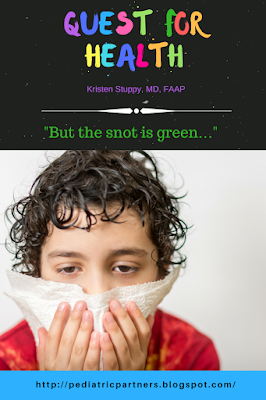Colds and coughs seem to continue forever. Especially since kids get recurrent viral infections this time of year, and they each run into the next illness. I often joke that it doesn't matter if kids get sick in October or January, it will go away by April. Bad joke, but it often seems that once kids start getting sick for the season, they stay sick most days until April.
Here's a graph from way back in 1967 that shows the timeline of a typical upper respiratory illness in an adult:
Remember that kids tend to stay sick longer (and are contagious longer) than adults, so if 20% of adults are still coughing on day 14, you can bet at least that many kids still are coughing with a cold or the flu.
So what can you do to help make kids feel better? As I always say: water, water water.
Water in the air helps thin the mucus, so increase the humidity in the bedroom during the dry winter months. Use a humidifier or vaporizer in the bedroom during illnesses even if your home has a humidifier attached to the heater. Humidifiers with a cool mist are safest with young children. Be sure to follow package directions for cleaning and changing the filter. Vaporizers are generally less work to use, but the steam comes out very hot and can burn young children. Again, follow package directions for proper cleaning and use. Allow it to dry out a bit during the day to avoid build up of mold.
Water in the nose in the form of saline can really help. The salt in the saline draws the fluid out of the swollen nasal passageways, decreasing the swelling and opening the airway to allow more mucus to be blown (or sucked) out.
Increase fluids that kids drink. Really push water. And unless a child is allergic to milk, it is an old wive's tale that milk will make the mucus worse. If that's what they want, they can have milk with a cold.
I think what really needs to happen is to get the mucus out. Using saline along with a strong blowing (or suctioning) of the nose is important.
For infants and younger children it can be hard to blow forcefully to get the mucus out. I have been disappointed in the use of a bulb suction because it is very difficult to make a seal and to have enough air to really get a good suction. They tend to cause trauma to the nose because you need to stick it up so high to make a seal. I like nasal aspirators that seal outside the nose and have a continuous flow of air. Check out How to use the Nosefrida. A similar nasal cleaner is available from Nasopure. (Note: I am not tied to either of these companies and do not get any payment from either company.)
For kids over 2 years old, washing the nose is one of the best ways to treat (and prevent) nasal congestion. Check out this video from Nasopure for an easy how to use. (Note: I do not get payment from this company, I simply love the Nasopure company. Not only does the product work well, it is also an all American company. Bottles are made in Kansas City and assembled by disabled adults in Columbia, Missouri.)
What medicines work?
If you choose to use medicines, pick one that has a single active ingredient. Many cold and flu medicines include several active ingredients to treat different symptoms. This increases the likelihood you will use a medicine that isn't needed (because you don't have that symptom) as well as increases the risks of side effects. Also if there is an allergic reaction, you won't know which component was the culprit.I don't recommend decongestants most of the time. They can make the mucus more thick, which plugs the nose more. If a child is old enough to say if it helps or not (generally over 6 years) and it helps, then it is okay to use a decongestant for a short term. Side effects are trouble sleeping, shakiness, nervousness, increased blood pressure and increased heart rate.
Antihistamines block the histamine that is triggered from allergies. It helps decrease the amount of mucus made when allergies flare, but don't help with the typical cold. Side effects are drowsiness, impaired coordination, excitability in children, and dry mouth.
Guaifenesin is supposed to help thin out mucus to help cough it up. Some studies say it works, others disagree. Again, if a child is old enough to say it helps and it does, use it. Otherwise don't. Side effects can include dizziness, drowsiness, confusion, blurry vision, or lightheadedness.
Studies do not show that any cough suppressant works very well. Honey has actually been shown to help better. Use honey only in kids over 1 year of age due to risks of botulism.
For influenza many people request Tamiflu. Here's my blog on Tamiflu describing why I will be forced to use a medicine I don't like. (It's too long to explain here.)
Another blog going in depth on cough medicines is Cough Medicine: Which one's best?



No comments:
Post a Comment